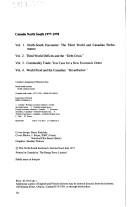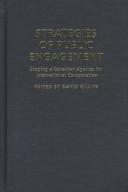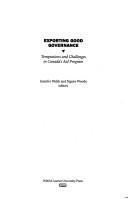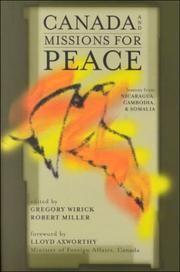| Listing 1 - 10 of 11 | << page >> |
Sort by
|
Book
ISBN: 9789004473973 9789004094161 Year: 1991 Publisher: Leiden;Boston Brill
Abstract | Keywords | Export | Availability | Bookmark
 Loading...
Loading...Choose an application
- Reference Manager
- EndNote
- RefWorks (Direct export to RefWorks)
Book
ISBN: 1554583535 1282166905 9786613809971 1554582415 9781554582419 9781282166905 6613809977 1554582237 9781554582235 9781554582235 1554582237 Year: 2011 Publisher: [Waterloo, Ont.] : Wilfrid Laurier University Press,
Abstract | Keywords | Export | Availability | Bookmark
 Loading...
Loading...Choose an application
- Reference Manager
- EndNote
- RefWorks (Direct export to RefWorks)
Long-Term Solutions for a Short-Term World demonstrates the complexity of the challenges that poor countries face and introduces the readers to the concept and impact of participatory research for development. Participatory research requires researchers to work with communities, governments, and other relevant actors to deal with common problems. Finding solutions requires participants to reflect critically on the cultural, economic, historical, political, and social contexts within which the issue under investigation exists. The book contains a collection of essays from development researchers and professionals, each of whom is an activist who has made significant contributions to the struggles of the poor in their own societies. Essays are presented as case studies and, in each, the contributor explains the specific development problem, the paths followed to solve the problem, lessons learned as a result of the research, and the development challenges on the horizon in his field of research.
Technical assistance, Canadian --- Economic assistance, Canadian --- Economic development --- Research

ISBN: 0920494013 Year: 1977 Publisher: Ottawa North-South Institute
Abstract | Keywords | Export | Availability | Bookmark
 Loading...
Loading...Choose an application
- Reference Manager
- EndNote
- RefWorks (Direct export to RefWorks)
Economic assistance, Canadian --- Technical assistance, Canadian --- 339.9 --- Canadian technical assistance --- Canadian economic assistance --- Buitenlandse economische betrekkingen. Internationale economische betrekkingen --- Canada --- Foreign economic relations. --- 339.9 Buitenlandse economische betrekkingen. Internationale economische betrekkingen

ISBN: 1282854852 9786612854859 0773566953 9780773566958 0773516778 9780773516779 0773516875 9780773516878 9781282854857 6612854855 Year: 1997 Publisher: Montreal ; Buffalo : McGill-Queen's University Press,
Abstract | Keywords | Export | Availability | Bookmark
 Loading...
Loading...Choose an application
- Reference Manager
- EndNote
- RefWorks (Direct export to RefWorks)
Development organizations need to reaffirm the Canadian consensus that international co-operation works and persuade the public and politicians that sustainable development is the key to human security and international order. The way to achieve this, contributors argue, is by demonstrating effectiveness and by systematically documenting, evaluating, and disseminating development successes through reasoned policy dialogue and strategic public engagement. Strategies of Public Engagement makes a valuable contribution to the search for new ways to enhance the relevance and value of development organizations in the twenty-first century. It will be of interest to readers concerned with NGOs, Canadian development assistance, and north-south relations.
Economic assistance, Canadian --- International economic relations. --- Economic policy, Foreign --- Economic relations, Foreign --- Economics, International --- Foreign economic policy --- Foreign economic relations --- Interdependence of nations --- International economic policy --- International economics --- New international economic order --- Economic policy --- International relations --- Economic sanctions
Book
ISBN: 9781400860951 1400860954 0691634661 0691605734 Year: 2014 Publisher: Princeton, NJ
Abstract | Keywords | Export | Availability | Bookmark
 Loading...
Loading...Choose an application
- Reference Manager
- EndNote
- RefWorks (Direct export to RefWorks)
As government officials and political activists are becoming increasingly aware, international nonprofit agencies have an important political dimension: although not self-serving, these private voluntary organizations (PVOs) and nongovernmental organizations (NGOs) seek social changes of which many of their financial contributors are unaware. As PVOs and NGOs receive increasing subsidies from their home governments in the United States, Canada, and Europe, they are moving away from short-term relief commitments in developing countries and toward longer-term goals in health, education, training, and small-scale production. Showing that European and Canadian NGOs focus more on political change as part of new development efforts than do their U.S. counterparts, Brian Smith presents the first major comparative study of the political aspect of PVOs and NGOs. Smith emphasizes the paradoxes in the private-aid system, both in the societies that send aid and in those that receive it. Pointing out that international nonprofit agencies are in some instances openly critical of nation-state interests, he asks how these agencies can function in a foreign-aid network intended as a support for those same interests. He concludes that compromises throughout the private-aid networkand some secrecymake it possible for institutions with different agendas to work together. In the future, however, serious conflicts may develop with donors and nation states.Originally published in 1990.The Princeton Legacy Library uses the latest print-on-demand technology to again make available previously out-of-print books from the distinguished backlist of Princeton University Press. These editions preserve the original texts of these important books while presenting them in durable paperback and hardcover editions. The goal of the Princeton Legacy Library is to vastly increase access to the rich scholarly heritage found in the thousands of books published by Princeton University Press since its founding in 1905.
Economic assistance, American --- Economic assistance, Canadian --- Economic assistance, European --- Non-governmental organizations --- European economic assistance --- Canadian economic assistance --- American economic assistance --- Mutual security program, 1951 --- -Moral and ethical aspects --- Moral and ethical aspects --- United States --- Canada --- Europe --- Foreign relations. --- E-books --- -European economic assistance --- -Canadian economic assistance

ISBN: 1282054686 9786612054686 1552500659 9781552500651 0889368724 9780889368729 Year: 1998 Publisher: Ottawa : Centre de recherches pour le developpement international,
Abstract | Keywords | Export | Availability | Bookmark
 Loading...
Loading...Choose an application
- Reference Manager
- EndNote
- RefWorks (Direct export to RefWorks)
Economic assistance, Canadian --- Peace. --- Coexistence, Peaceful --- Peaceful coexistence --- International relations --- Disarmament --- Peace-building --- Security, International --- War --- Canadian economic assistance --- History. --- Canada --- Canada (Province) --- Canadae --- Ceanada --- Chanada --- Chanadey --- Dominio del Canadá --- Dominion of Canada --- Jianada --- Kʻaenada --- Kanada (Dominion) --- Ḳanadah --- Kanadaja --- Kanadas --- Ḳanade --- Kanado --- Kanakā --- Province of Canada --- Republica de Canadá --- Yn Chanadey --- Καναδάς --- Канада --- קאנאדע --- קנדה --- كندا --- کانادا --- カナダ --- 加拿大 --- 캐나다 --- Lower Canada --- Upper Canada --- Foreign relations --- Armed Forces --- Kaineḍā

ISBN: 1299313450 1554581427 1435628462 9781554580293 1554580293 9781435628465 9781554581429 9781299313453 Year: 2007 Publisher: Waterloo, Ont. : Wilfrid Laurier University Press,
Abstract | Keywords | Export | Availability | Bookmark
 Loading...
Loading...Choose an application
- Reference Manager
- EndNote
- RefWorks (Direct export to RefWorks)
Can good governance be exported? International development assistance is more frequently being applied to strengthening governance in developing countries, and in Exporting Good Governance: Temptations and Challenges in Canada's Aid Program, the editors bring together diverse perspectives to investigate whether aid for good governance works. The first section of the book outlines the changing face of international development assistance and ideas of good governance. The second section analyzes six nations: three are countries to which Canada has devoted a significant portion of its
Organisation internationale. --- Aide economique --- Aide economique canadienne --- Conditionnalite (Relations internationales) --- International organization. --- Economic assistance --- Economic assistance, Canadian --- Conditionality (International relations) --- Canadian economic assistance --- Political conditionality --- International relations --- Loans, Foreign --- Federation, International --- Global governance --- Interdependence of nations --- International administration --- International federation --- Organization, International --- World federation --- World government --- World order --- World organization --- Congresses and conventions --- Peace --- Political science --- International agencies --- International cooperation --- Security, International --- World politics --- Aspect politique --- Political aspects

ISBN: 0889368678 1552500640 1280717459 9786610717453 9781552500644 9780889368675 9781280717451 6610717451 Year: 1998 Publisher: Ottawa : International Development Research Centre,
Abstract | Keywords | Export | Availability | Bookmark
 Loading...
Loading...Choose an application
- Reference Manager
- EndNote
- RefWorks (Direct export to RefWorks)
Canada and Missions for Peace explores Canada's involvement in recent international efforts to resolve violent conflicts in Nicaragua, Cambodia, and Somalia. It examines the complex interface between foreign policy, international security, and international development. In doing so, this book joins the ever-growing body of scholarship on the new peacebuilding agenda, offering a unique vantage point.
International relations. Foreign policy --- Polemology --- Development aid. Development cooperation --- Cambodia --- Nicaragua --- Canada --- Somalia --- Economic assistance, Canadian --- Security, International. --- Peace. --- Coexistence, Peaceful --- Peaceful coexistence --- International relations --- Disarmament --- Peace-building --- Security, International --- War --- Collective security --- International security --- International organization --- Peace --- Canadian economic assistance --- Political aspects --- Foreign relations --- Armed Forces --- History. --- Canada (Province) --- Province of Canada --- Dominion of Canada --- Ḳanadah --- Ḳanade --- Kanada (Dominion) --- Chanada --- كندا --- Канада --- Καναδάς --- Kanadas --- Republica de Canadá --- Dominio del Canadá --- Kanado --- کانادا --- Ceanada --- Yn Chanadey --- Chanadey --- 캐나다 --- Kʻaenada --- Kanakā --- קנדה --- カナダ --- Canadae --- Kanadaja --- 加拿大 --- קאנאדע --- Upper Canada --- Lower Canada
Book
ISBN: 0774826045 1299781004 077482901X 0774829001 0774826037 0774826053 0774829028 9780774829021 9780774829038 0774829036 9780774826051 9780774826051 9781299781009 9780774826037 9780774826037 9780774826044 9780774826068 0774826061 Year: 2015 Publisher: Vancouver, British Columbia : UBC Press,
Abstract | Keywords | Export | Availability | Bookmark
 Loading...
Loading...Choose an application
- Reference Manager
- EndNote
- RefWorks (Direct export to RefWorks)
In 1974, India shocked the world by detonating a nuclear device. In the diplomatic controversy that ensued, the Canadian government expressed outrage that India had extracted plutonium from a Canadian reactor donated only for peaceful purposes. In the aftermath, relations between the two nations cooled considerably. As Conflicting Visions reveals, Canada and India’s relationship was turbulent long before the first bomb blast. From the time of India’s independence from Britain, Ottawa sought to build bridges between Indian and the West through dialogue and foreign aid. New Delhi, however, had a different vision for its future, and throughout the Cold War mistrust between the two nations deepened. Ryan Touhey draws on archival records, personal papers, and interviews from Canada, India, the United States, and Britain to trace the breakdown of this complicated bilateral relationship. In the process, he deepens our understanding of the history of Canadian foreign aid and international relations during the Cold War.
Cold War. --- World politics --- India --- Canada --- Canada (Province) --- Province of Canada --- Dominion of Canada --- Ḳanadah --- Ḳanade --- Kanada (Dominion) --- Chanada --- كندا --- Канада --- Καναδάς --- Kanadas --- Republica de Canadá --- Dominio del Canadá --- Kanado --- کانادا --- Ceanada --- Yn Chanadey --- Chanadey --- 캐나다 --- Kʻaenada --- Kanakā --- קנדה --- カナダ --- Canadae --- Kanadaja --- 加拿大 --- קאנאדע --- Upper Canada --- Lower Canada --- Indland --- Ḣindiston Respublikasi --- Republic of India --- Bhārata --- Indii︠a︡ --- Inde --- Indië --- Indien --- Sāthāranarat ʻIndīa --- Yin-tu --- Bharat --- Government of India --- インド --- Indo --- Foreign relations --- Economic assistance, Canadian --- Technical assistance, Canadian --- History --- SO --- History. --- Jianada --- هند --- Индия --- Canadian technical assistance --- Canadian economic assistance --- Cold War (1945-1989) --- 1945 - 1989 --- Kaineḍā
Book
ISBN: 0773540563 077358708X 0773540571 9780773587083 9780773540569 9780773540576 9780773540576 9780773540569 0773587098 Year: 2012 Publisher: Montreal : McGill-Queen's University Press,
Abstract | Keywords | Export | Availability | Bookmark
 Loading...
Loading...Choose an application
- Reference Manager
- EndNote
- RefWorks (Direct export to RefWorks)
The Canadian International Development Agency (CIDA) allocates vast sums of money each year, providing vital assistance to countless individuals across the developing world. Yet many observers and insiders have sharply criticized CIDA for its lack of concrete results. Presenting a range of work by scholars and practitioners, this collection offers the most comprehensive examination of CIDA's efforts in over a decade. Contributors explore recent trends in Canadian foreign aid, including topics such as its place in Canadian politics, gender and security concerns, advocacy and public engagement, the complexity of CIDA policies, and CIDA's relationship with non-governmental organizations. The perspectives assembled in Struggling for Effectiveness bring clarity to the issue of foreign aid while judiciously gauging Canada's record and offering concrete suggestions for strengthening CIDA's efforts to help people living in poverty. Extensively researched and comprehensive in scope, Struggling for Effectiveness will be indispensable to anyone interested in Canadian assistance abroad and Canada's place in a rapidly changing world. Contributors include Stephen Baranyi (University of Ottawa), David Black (Dalhousie University), Elizabeth Blackwood (Simon Fraser University), Stephen Brown (University of Ottawa), Dominique Caouette (Université de Montréal), Adam Chapnick (Canadian Forces College), Denis Côté (Canadian Council for International Cooperation), Molly den Heyer (Dalhousie University), Nilima Gulrajani (Oxford University), Hunter McGill (University of Ottawa), Anca Paducel (Graduate Institute of International and Development Studies, Geneva), Rosalind Raddatz (University of Ottawa), Ian Smillie (independent scholar and consultant), Veronika Stewart (Simon Fraser University), and Liam Swiss (Memorial University of Newfoundland).
Economic assistance, Canadian --- History --- Canadian International Development Agency. --- Canada --- Economic policy. --- Canadian economic assistance --- A.C.D.I. --- ACDI --- Agence canadienne de développement international --- Agencia Canadense para o Desenvolvimento Internacional --- Agencia Canadiense de Desarrollo Internacional --- Agencia Canadiense para el Desarrollo Internacional --- C.I.D.A. --- Canada. --- CIDA --- Kanadsʹka ahent︠s︡ii︠a︡ miz︠h︡narodnoho rozvytku --- Kanadskoe agentstvo po mezhdunarodnomu razvitii︠u︡ --- ʻOngkān Bō̜rihān Withētsakit hǣng Prathēt Khāenādā --- ʻOngkān Bō̜rihān Withētsakit hǣng Prathēt Khānādā --- Wakālah al-Kanadīyah al-Dawlīyah lil-Tanmiyah --- E-books --- Badan Kerjasama Pembangunan Internasional Kanada --- 加拿大国际发展署 --- Jianada guo ji fa zhan shu --- ʻOngkān Bō̜rihān Withētsakit hǣng Prathēt Khāenādā --- ʻOngkān Bō̜rihān Withētsakit hǣng Prathēt Khānādā
| Listing 1 - 10 of 11 | << page >> |
Sort by
|

 Search
Search Feedback
Feedback About UniCat
About UniCat  Help
Help News
News